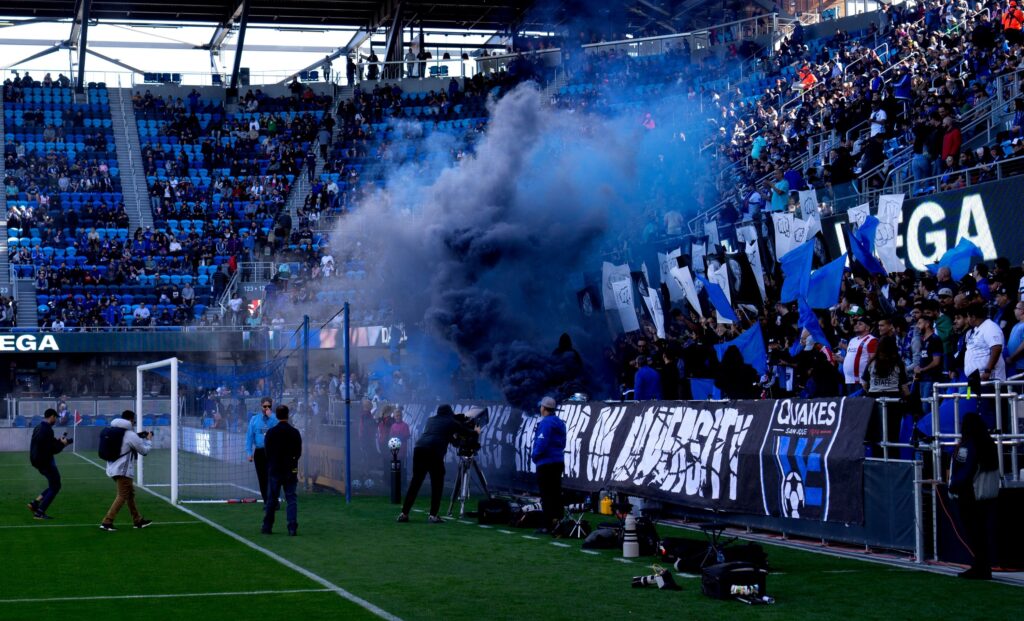Soccer, often referred to as “the beautiful game,” has been gaining momentum in North America for decades. While sports like hockey, basketball, and baseball have traditionally dominated the year, Major League Soccer (MLS) has been steadily evolving as a professional league. In this blog, we’ll dive into everything you need to know about Major League Soccer, exploring its inception, growth, and exciting prospects.
Canoo has partnerships with MLS teams across Canada! Download today and see what discounts you get on tickets to upcoming games.
History of the League
Major League Soccer kicked off its inaugural season in 1996, marking a significant moment in sports history. It was a huge venture! The MLS was following in the footsteps of the North American Soccer League (NASL), which, despite its early success in the 1970s eventually folded in the 1980s. The NASL was then quickly forgotten. A question on everyone’s minds was: could soccer truly capture the hearts of sports fans in North America?
The initial seasons saw challenges of low attendance, low TV ratings, and financial instability. However, the league persisted, nurturing a generation of local talent and attracting international stars like David Beckham, Lionel Messi, Thierry Henry, and Zlatan Ibrahimović, who brought a spotlight to MLS.
Now, Major League Soccer is the top professional league for soccer clubs in Canada and the United States. With 29 teams currently in the league, Canada has 3 strong contenders that rally support from the north with each game.
Where to Watch MLS in Canada
When it comes to watching MLS games in Canada, you have several options at your fingertips:
Apple TV+
MLS games are available through the Apple TV app. If you’re an Apple TV+ subscriber, you can catch all the action seamlessly.
MLS Season Pass
MLS Season Pass is another fantastic option. It provides access to MLS games directly through the Apple TV app, making it a convenient choice for fans.
Live TV Streaming Services
You can also stream select MLS games through popular live TV streaming services that carry FOX and FS1. Services like fuboTV, Hulu + Live TV, and YouTube TV offer MLS coverage, allowing you to watch games from the comfort of your home.

How MLS Works
MLS operates on a unique schedule compared to European leagues. The season kicks off in late February and runs until October, which is quite different from the August-to-May schedule in Europe. One of the most distinguishing features of MLS is its playoff format, which determines the season’s champion.
MLS adopts a knockout playoff structure, a format familiar to fans of the NFL in the United States and Canada. Here’s how it works:
Seven teams from each conference (Eastern and Western) make it to the playoffs. The top team in each conference earns a bye in the first round. The remaining teams within each conference compete in a bracket-style playoff. The winners of each conference’s bracket face off in the MLS Cup, where the ultimate champion is decided. This unique playoff system adds an extra layer of excitement to the MLS season, making it a must-watch for soccer fans.
Eastern and Western Conferences
Major League Soccer is divided into two conferences, the Eastern and Western Conferences. Here’s a breakdown of the teams in each conference, with a note that there are more teams expected in the future:
Western Conference
Austin FC
Colorado Rapids
FC Dallas
Houston Dynamo FC
LA Galaxy
Los Angeles FC (LAFC)
Minnesota United FC
Portland Timbers
Real Salt Lake
San Diego FC
San Jose Earthquakes
Seattle Sounders FC
Sporting Kansas City
St. Louis City SC
Vancouver Whitecaps FC
Eastern Conference
Atlanta United FC
Charlotte FC
Chicago Fire FC
FC Cincinnati
Columbus Crew
D.C. United
Inter Miami CF
CF Montréal
Nashville SC
New England Revolution
New York City FC
New York Red Bulls
Orlando City SC
Philadelphia Union
Toronto FC

Major Canadian Teams
As MLS continued to grow, it made significant strides in developing soccer culture across the United States and Canada. Soccer fans have had the chance to build their traditions in stadiums, creating more vibrant atmospheres for fans. These stadiums became hubs of excitement and passion for soccer enthusiasts. Here are the Canadian teams that will surely capture your support!
Club de Foot Montreal

Club de Foot Montreal, formerly known as the Montreal Impact, is one of the three Canadian MLS teams hailing from the province of Quebec. Montreal’s soccer culture is deeply influenced by its French heritage. This is reflected in the club’s name change to Club de Foot Montreal.
Over the years, Montreal has seen its share of success in MLS, making playoff appearances and even reaching the final of the CONCACAF Champions League. The team has showcased talent from around the world, contributing to the global appeal of MLS.
Toronto Football Club

Toronto FC’s journey in MLS has been marked by both highs and lows. The club achieved immense success in 2017 when it captured the MLS Cup, the first time a Canadian team had earned this title. The victory ignited a sense of pride among Canadian soccer fans and reinforced the club’s status as a powerhouse in MLS.
BMO Field, located in downtown Toronto, serves as the club’s home ground and is a symbol of the passionate fan base’s dedication. The stadium is known for its electric atmosphere during matches, with supporters singing and chanting throughout the entire game.
Vancouver Whitecaps Football Club

The Vancouver Whitecaps round out the trio of Canadian MLS teams. Founded in 1974, the Whitecaps have a long and storied history in North American soccer. They officially joined MLS in 2011, finally bringing their rich soccer tradition to the league.
The Whitecaps have showcased their commitment to youth development, with the Whitecaps FC Academy consistently producing promising Canadian talent. This dedication to nurturing homegrown players aligns with the broader goal of strengthening Canadian soccer.
Major League Soccer has come a long way since its inception in 1996. It has grown from a fledgling league into a vibrant and competitive soccer community that captures the imagination of fans both in North America and around the world. With a commitment to youth development, the rise of Canadian stars, and continued global expansion, the future of MLS looks brighter than ever.





